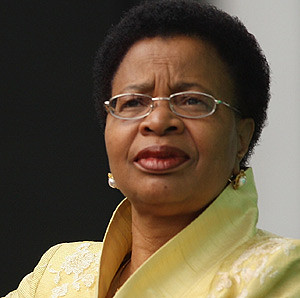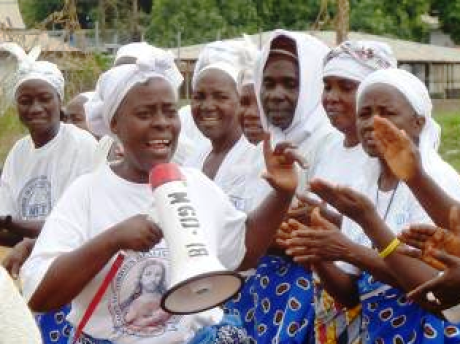Liberian Women: The Greatest Assets of the Nation
By
Edmund Zar-Zar Bargblor
African women play a critical role in society. Upon careful scrutiny of African society, women are generally banished from the public spheres of power. When they are urged to participate in the political life of their countries through civil and political authority, for instance, they often become indebted to the “chief” to whom they owe their “promotion”. Women can pay back this debt in a humiliating way. Outside of the political arena, African women demonstrate their merits in other ways. This ambivalent role is disclosed through the figures of mother, spouse and educator. Through these eminent and unique roles, whereby women hold the indispensable function of life giver and peacekeeper, they exercise the power to protect life in dignity and pride more so than anyone else in African society.
 One of the specific attributes of the African woman is her role as an educator. Education entails not only the teaching of human and cultural values, but as mothers and educators, women lead their sons and daughters on the road to a good life. Genuine education involves the shaping of character through the example of the educator. This challenging aspect of the role of the African woman requires that she live a life worthy of imitation. In African tradition, women are the first pedagogues in the sense that they are the first to lead their children. It is this attribute that explains why African women are capable of doing anything they can to sustain a disrupted family.
One of the specific attributes of the African woman is her role as an educator. Education entails not only the teaching of human and cultural values, but as mothers and educators, women lead their sons and daughters on the road to a good life. Genuine education involves the shaping of character through the example of the educator. This challenging aspect of the role of the African woman requires that she live a life worthy of imitation. In African tradition, women are the first pedagogues in the sense that they are the first to lead their children. It is this attribute that explains why African women are capable of doing anything they can to sustain a disrupted family.
The wounds inflicted by the Liberian civil war on youth, especially young girls – physical injury, gender-based violence, psychosocial distress, are affronts that would have a lasting impact on the present and future human resource development of Liberia. Armed conflict affects all aspects of child development, such as physical, mental, and emotional components.
Madame Susan McKay, Professor at the Nursing and Woman’s Studies, University of Wyoming, pointed out in her article that the “impact of armed conflict on children, especially infants and young children, cannot be considered in isolation from women. Women are the primary child caregivers, when they are affected by war, so are children. In many cultures, mothers, older sisters, aunts, and grandmothers share responsibility for children’s physical and psychosocial development. As men leave to fight, women are increasingly responsible for maintaining the social fabric of their communities. During and after wars, women are instrumental in providing a sense of family and community that supports children’s healing from war-related trauma. Women’s physical and psychosocial health and survival are therefore critical to the well-being of children, both during and after armed conflict. And yet, the perilous conditions children experience in war zones are often discussed in isolation from the women who nurture and care for them”
The wars have affected children’s physical and mental health, their day-to-day life, and hopes for the future. The wars have also extracted a heavy toll on the healthcare system through the loss of facilities and infrastructure, supplies and equipment, and of physicians and nurses, while the economic hardships of war have resulted in fewer resources for healthcare. The number of doctors decreased gradually as the war years progressed. The exploitation of young Liberian girls, cannot be overemphasized.
The civil war has even complicated this unhealthy situation, especially for young women. Most of our young women that travelled to foreign countries were victimized. In 2015, it was reported in Monrovia, that more than 50 young women were reportedly trafficked over the period of three years to Lebanon, accordingly work as domestic servants and sex slaves. Before leaving Liberia, some girls at age 16, 17 and 18 were told that they were going to work in factories and supermarkets. Upon arrival in Lebanon different people who had paid $3,500.00 United States dollars, as the price for their independence, freedom and the right to say no to sex, came at the airport to pick up their new ‘slaves’. FrontPage Africa reported that the President of the Association of a Women Organization, Madame Seton-Cee said: “We are calling on the government of Liberia, the judiciary to take full responsibility to send those girls to court. Let us hear their side and the side of the accused. We want to know both sides of the story. As a women organization, this is a case of interest to us. We want to know who were involved and how those girls were taken there” (Front Page Africa, 15July 2015).
Mr. Rodney D. Sieh reported that the ‘United States Government through the Department of State says Liberia remains a major source and destination for the trafficking of men, women, and children who are being subjected to forced labor and sex trafficking. The U.S. assertions are contained in the 2015 edition of the annual Trafficking in Persons (TIP) Report which places Liberia in the Tier 2 Category, just above the dangerous watch list’ (Front Page Africa, 28 July 2015).
Even in the great United States, had its share in using Liberian girls as slaves. In Newark, New Jersey, CNN reported that young Liberian girls arrived in the United States from West Africa, held against their will and forced to work for hours on end
Nowadays in this male dominated society, women are being discriminated. Women must, hence, be educated and have a better health status. It would lead to true development of the society and the nation at large. Though women have displayed tremendous gains, many them still must face a lot of hurdles while trying to make it big in life. In order to bring them in the limelight, they need to be empowered.
When I was growing up in Liberia, I observed with sadness the culture of dependency created upon young Liberian women. God-Pa or Sugar Daddy was a practice where young girls will go out with older men, (Big men, usually government officials, simply for financial support). Most Liberian mothers encouraged their daughters to go out with government officials or big men, just for financial support. This tendency has evolved to a situation, where foreign merchants or businessmen who were perceived to be financially sound, took advantage of young Liberian girls. The Lebanese and other foreign businessmen took advantage of this situation. The situation is even terrible now in Monrovia and all over other cities in Liberia.
Liberian women are the greatest assets of the nation. Empowerment of women is necessary to transform the Liberian nation into a developed country. At the core of the concept of empowerment of Liberian women, is the idea of power. Women empowerment generally has five components: first, a woman’s sense of self-worth; second, her right to have and exercise her choices; third, her right to have access to opportunities; fourth, her right to have the power to control her own life and last, her ability to influence the direction of social change to create a social and economic order.
Knowledge is essential to drive progress. When educated children, especially girls grow up, they will play an important role in our society. They will influence public decisions. They will inform government policies. They will become the drivers of economic and social growth. Education is a tool for collective social and economic advancement. At the same time, it is essential for individual success. It is through education that individuals tap into career opportunities.
Though women have made some progress, at present, many of them still face a lot of hurdles. To bring them in the limelight, they need to be empowered. The sad images of Liberian girls as sex slaves in Lebanon draws one attention for us to do more in the education of Liberia’s female population. Young girls are the future mothers of a nation. Their preparation in society is an important one. It is this preparation that helps them to guide the future generations of the Liberian nation.
The Report by Graca Machel, Expert of the Secretary-General of the United Nations identified recommendations on some of the solutions that have been discussed and put in place at the international level. Some recommendations for action as put  forth by the United Nations are:
forth by the United Nations are:
1. Programmes at the national and local levels, should be designed to place special emphasis on providing appropriate educational and recreational activities for adolescents affected by armed conflicts.
2. Special efforts should be made for demobilized adolescent soldiers, such as projects which offer alternative livelihoods and promote their reintegration into their communities. Human resources development, including youth education, employment and training schemes, should be promoted.
3. Intergovernmental bodies, United Nations agencies and other organizations should support Governments in strengthening national legislative frameworks challenging any aspect of discrimination against women, girls and child-headed households with respect to custody, inheritance and property rights.
4. United Nations bodies and NGOs are urged to give urgent attention to the situation of child-headed households and develop policy and program guidelines to ensure their protection and care.
A World Bank’s blog, advances five steps, designed to foster strategies on improving girls education, skills and job prospects. These strategies are herewith produced , in the benefit of the reading public.
“First, give girls a strong foundation through early childhood development (ECD). Disadvantages built early in life are difficult to remedy, but effective ECD programs can avoid such disadvantages and thereby yield high payoffs. ECD programs build the technical, cognitive, and behavioral skills conducive to high productivity later in life. Successful interventions emphasize, among other areas, nutrition, stimulation, and basic cognitive skills.
A new study suggests that in Jamaica, 20 years after an ECD intervention was conducted, the average earnings of beneficiaries – boys and girls – were 42% higher than those of the control group. While such large gains might not be obtained if all children were benefiting from such interventions, which is the aim, it is nevertheless clear that early psychosocial stimulation can substantially improve future earnings.
The second step focuses on basic education. Gaps remain, to be sure: Data from a forthcoming paper suggest that in 24 low-income countries, only 34% of girls in the poorest 20% of households complete primary school, compared with 72% of girls in the richest 20% of households. These income-related gaps can be reduced through interventions to reduce the opportunity cost of schooling for girls, such as conditional cash transfers.
In Yemen, one such new program targeting girls in grades 4-9 in disadvantaged communities is reaching close to 40,000 girls. In addition to increasing enrollment and attendance, we also need to ensure that all girls who go to school can learn—by building stronger schooling systems with clear learning standards, good teachers, adequate resources, and a proper regulatory environment that emphasizes accountability.
But learning for what? Education for its own sake certainly has an intrinsic value, but education and training that proves useful in the workplace is also essential.
The third step in helping girls grow is to provide them with job-relevant skills that employers demand, or that they can use in launching their own business.
Step four relates to the creation of an environment that encourages investments in knowledge and creativity. This requires innovation-specific skills and investments to help connect people with ideas, as well as risk management tools that facilitate innovation.
A new program in Uganda run by the nongovernmental organization BRAC provides girls age 14-20 with a safe space, life skills training, and livelihoods training for self-employment based on local market conditions. This program generated significant income gains from self-employment with no adverse effects on schooling outcomes. In addition, childbearing among beneficiaries declined, the proportion of girls using condoms increased, and the incidence of forced sex decreased.
The fifth and last step, it is important that societies promote flexible, efficient, and secure labor markets. Apart from avoiding rigid job protection regulations while strengthening income protection systems, providing intermediation services for workers and firms is important to transform skills into actual employment and productivity” (blogs.worldbank.org).
The incoming administration of President George Weah needs to develop an education agenda that will put in place a comprehensive program oriented to providing adolescents, especially girls, a sense of meaning and purpose by involving them in developing and implementing programs in the varies counties. Adolescents have special needs and special strengths, and they should be survivors and active participants in creating solutions, not just as victims or problems. In order to ensure that their needs are met, young people should be involved in community-based relief, recovery and reconstruction programs. This can be achieved through, for example, vocational and a skill training that not only help to augment youth’s incomes, but also increases their sense of identity and self-worth in ways that enhance their psychosocial well-being (childrenandarmedconflict.un.org).
Education opens doors to a better life standard. It brings constructive meaning in life. It trains individuals to think critically, to make informed decisions and to act with sound conviction. In light of this, it is vital for a society to invest in educating its young ones. The education of Liberia’s young women, is essential to Liberia’s future economic progress and prosperity. When we empower our young women, the issue of girls trafficking in foreign countries would be a thing of the past. Subsequently, the psychological ramifications of Madame Sirleaf’s Presidency in Liberia cannot be overemphasized. It goes beyond the political realm, moved within the domain of women empowerment. Madame Sirleaf’s presidency and the Vice President-Elect Jewel Howard-Taylor
are not so much about the attainment of political power, but the awakening of the spirits of Liberia’s women-hood, especially Liberia’s young girls, the future mothers of the land. Their attainment provides an opportunity for our daughters, to also dream of a better tomorrow and a better Liberia.
Let me pay tribute to the young girls and women of Liberia
by close a poem written by Chief O. Okereke (an African Intellectual).
Liberia: Thou Shall Rise Again
=======================
Land of freedom;
Land of the setting sun;
In Americas you rose;
Freedom in sought.
Land of great heros;
Land of revolutionaries;
Liberia or liberty;
Sierra Leon bemoaned.
Beautiful seashore home;
Pride of Africa;
Symbol of blackness;
Great black icon.
Thou shall rise again;
African Union enshrined;
Thy labor to bear fruit;
Bounty, peace, freedom.
Liberia, thou you shall rise again!!!
********************************
Author:

Mr. Edmund Zar-Zar Bargblor is an Educator. He is a graduate of Cuttington University, Liberia; Howard University, Washington, D.C, and Israel Institute of Technology, Haifa, Israel. He is a former Deputy Managing Director of the National Port Authority of Liberia, NPA. He can be contacted at: [email protected]







